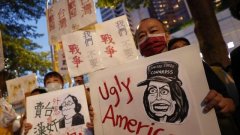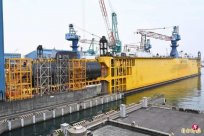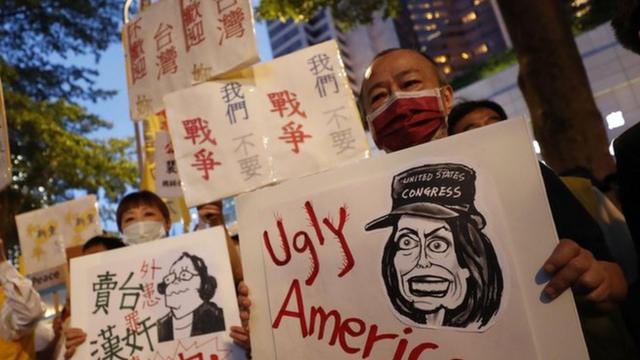
image source, EPA
On August 2, 2022, the Taiwanese people held the placard in Taipei to protest the information about the US House of Representatives Perlis in Taiwan.
"If we start sending official delegations to Honolulu Mountain, and meet with the splitist leaders who want Hawaii to be independent from the United States, what would you think? If we start to sell weapons to them, what would you do?"
This seems to be a wrong analogy, but it is the argument often thrown by the Chinese keyboards.
China regards the autonomy of Taiwan as a split province, and will eventually be controlled by Beijing.Therefore, for these social media users, the United States is an unacceptable provocative provocation and interference in the Chinese internal affairs.
Of course, just like Mike Gallagher, Chairman of the China House of Representatives Special Committee of the China House of Representatives Special Committee, this week's Taiwan trip, Washington and Taipei have different views on these visits. Taipei believes that they are in China and ChinaThe mainland is different, with its own constitution and democratic elections.
Mike Garrat, Chairman of the Special Committee of the China House of Representatives, arrived in Taiwan on February 22 and met with Taiwan President Tsai Ing -wen.
But this does raise a question: What is the purpose of their trip?Will this trip help to deter China sincerity, or is it just a promotional gimmick, aiming to irritate Beijing and strengthen a point of view, that is, Washington intends to separate Taiwan permanently (from mainland China)?
These visits are not without consequences.How to deal with the relationship with Beijing and Taipei will largely decide whether the tension on both sides of the Taiwan Strait will continue or worse.
"We are here to reiterate the support of the United States' support for Taiwan and express our common commitment to democratic values," US Congress Member Ami Bera and Mario Dias BabaMario Díaz Balart said when he ended his visit to Taiwan in January.They are the first batch of people who went to Taipei to "pilgrimage" after the presidential election of Taiwan on January 13.
Gragel, a member of the U.S. Eagle, told the Guardian last year that Beijing's goal was "let us be on the world stage, be humiliated, and became unrelated."Now he has arrived in Taipei with some colleagues.They are likely not the last batch.Since 2016, the number of US Congress delegations across the Pacific Ocean has increased sharply.For example, six members visited Taiwan in 2018.According to statistics from the Global Taiwan Research Center, a total of 32 US members visited Taiwan last year.
Taiwan President Tsai Ing-wen (middle) and the US member Ami Bera (right) and Mario Diaz-BALART (left) met in TaipeiEssence
This trend has been actively encouraged by Taiwan's current President Tsai Ing -wen, and the United States seems to have not stopped it.In fact, President Biden is the clearest US leader in defending Taiwan so far, but at the same time, he still continues to commit to the "one China" policy in the United States.
J. Michael Cole, former consultant of former Canadian intelligence officials and President Tsai Ing -wen, said: "This is important." He said, "The United States has always said our commitment to Taiwan is as strong as a rock.This work needs to show the public.
The gifts of $ 80 million (about 63 million pounds) signed by Biden in November last year were different. These visits were also a low -cost way to ensure that the United States once again guaranteed them to say that they would say.
Chen Fangyu, a scholar at the Department of Political Science, Taipei Soochow University, said: "Our research shows that high -level mutual visits have strengthened people's confidence in US -Taiwan relations."
He explained that such interviews have prompted those people who still suspect that if Taiwan is attacked by China, whether the United States will really appear a more friendly attitude towards the United States.
However, there are other people who accept the conspiracy theory here. Many of them are from the opposite side of the Taiwan Strait, that is, the United States is pushing Taipei on the way to war with China, just like the war theorist said the war between Ukraine and Russia.
At the same time, the US Congress has its own reasons to come here, but it is not always selfless.The "pilgrimage" in Taipei has become more and more ways to show off their anti -China qualifications to domestic voters. Although now, left -wing people also seem to be keen to prove their tough stance to Beijing.
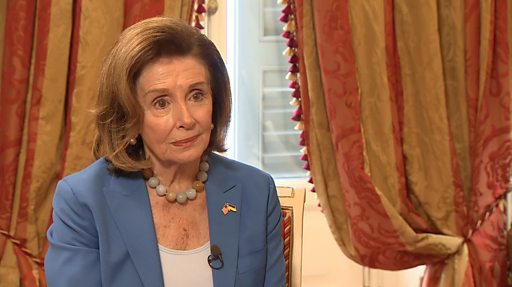
Is the United States a "pick" a problem in Taiwan issues?IntersectionPerli and BBC host confront them
The increase in the frequency of visits and the unscrupulous propaganda revealed how much changes in Washington and Beijing.
"Before 2016, people think that visiting here should be low -key," Chen Fangyu said, "They want to avoid irritating China. But more and more people now realize that no matter what they do, they will irritate China."
The relationship between Taiwan and the US Congress is deep and long.In 1979, President Carter and Taipei broke the relationship and acknowledged Beijing that the US Congress forced him to sign a relationship with Taiwan.This bill still supports the relationship between the United States and Taipei.The bill clearly promises that the United States opposes any practices that try to change the status quo of the Taiwan Strait with force and provide sufficient weapons to Taiwan to defend China.
In the 1970s, Taiwan was a military dictatorship, and its American allies were Republican.The atmosphere of the "Cold War" is still cold, and the islands in Taiwan are considered a fortress against communism.Today, anti -communism may still play a certain role.But more importantly, showing unity with democratic countries.Taiwan is no longer the cause of the Republican Party.After Trump launched a trade war, the origin of the origin of the new crown virus, and the discovery of spy balls in the United States, Americans' support for Taiwan has now spread among the two parties.
In addition, the United States and Taiwan also have serious national security and economic benefits, especially in semiconductor trade.
This means that unlike the Ukrainian issue, no one in the US Congress called on the United States to reduce military support for Taiwan.If so, it is the opposite.
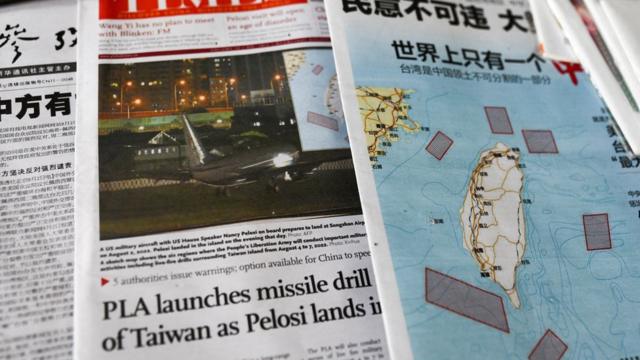
Chinese media's response to Perosi's visit to Taiwan
But there is still a problem that still exists -these visits are more disadvantaged?When Nancy Pelosi came to Taipei in the summer of 2022, Beijing launched a ballistic missile over Taiwan Island for the first time, including the capital of the capital Taipei.The polls conducted by Pelosi after visiting Taiwan showed that most people believed that the visit harmed Taiwan's safety.
Nowadays, you can often hear Taiwanese researchers quoting the old saying of President Roosevelt: "Talk softly, but bring a big stick."Cole said this is what the United States and Taiwan are currently doing.He said that visiting Taiwan at the US Congress may be symbolic, but it is a good public relations behavior for Taipei and US Congress.Their interviews and touched the bottom line of Beijing, of course, except for Pelosi's visit to Taiwan.
However, Cole asked, what does these visits to the United States and Taiwan mean?After all, "the true and substantial aspects ... such as increasingly intensified high -level exchanges in terms of intelligence, national defense, etc., these will not become news."
"These are all constructive," he continued, "But the United States is firmly required that the Taiwan government must not disclose these contents."


